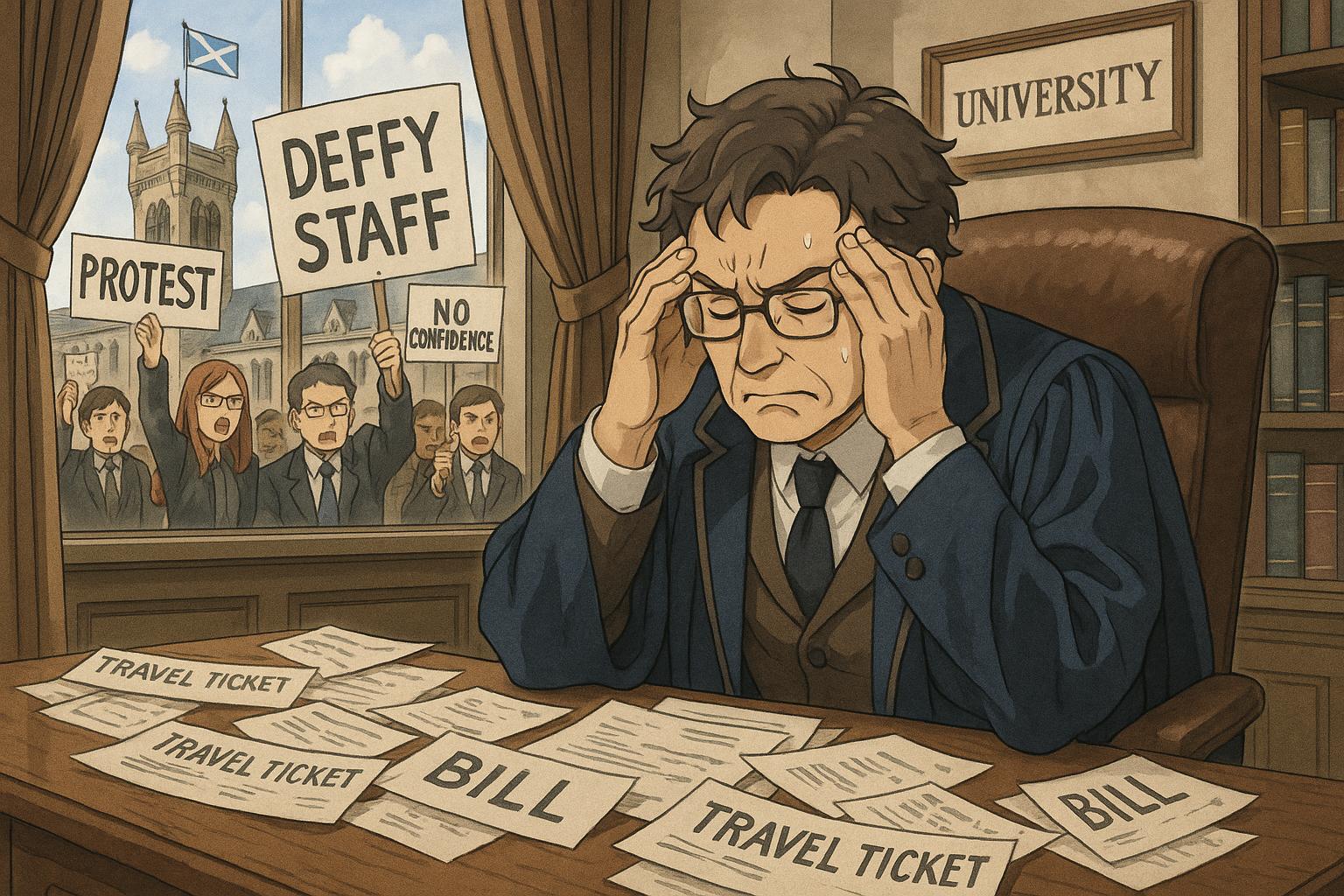University of the West of Scotland faces staff backlash over Principal James Miller’s costly international travel during a £14.4 million deficit year, triggering a vote of no confidence amid broader financial crises in Scottish universities.
The ongoing financial turmoil at the University of the West of Scotland (UWS) has come into sharp focus following revelations about lavish spending by Professor James Miller, the institution’s principal and vice-chancellor. As staff prepare for a vote of no confidence in Miller, his claimed travel expenses of over £37,000 in just two years have sparked outrage among both faculty and students. The breakdown includes trips to exotic destinations such as Dubai, Kuala Lumpur, and a particularly controversial excursion to Barbados, which cost £5,970.
These financial decisions are especially troubling in light of the university’s reported deficit of £14.4 million for the current academic year. With the UWS facing potential job cuts and diminished student services, the apparent extravagance of its senior management has led to vocal criticism from unions. John Mooney, a regional organiser for UNISON, stated, “This spending on executives’ international travel, while the deficit rises by millions of pounds and they cut jobs and student services, shows an astounding level of mismanagement.” This sentiment is echoed by staff at the university, with 85% of EIS members voting in favour of industrial action over compulsory redundancies.
Furthermore, context about financial strains in higher education in Scotland only intensifies the scrutiny of Miller’s actions. Other Scottish universities are also grappling with financial imbalances. For instance, Professor Iain Gillespie of Dundee University accumulated a travel bill of £131,000 amid a glaring £30 million deficit, raising ongoing questions about the appropriateness of such expenditures during times of fiscal austerity. Despite this, some institutions justify high expenses by pointing to the potential financial benefits from international collaborations and recruitment efforts.
Miller’s appointments to high-profile events, such as a $2,782 return trip to New York for the Tartan Day Parade, augment perceptions of misallocation of funds. Critics argue that while international engagement is essential for future sustainability, the timing and magnitude of such costs is questionable, especially amid widespread calls for cuts to faculty and student resources.
This discontent among staff is compounded by the knowledge that Scotland’s free tuition policy, while beneficial for broadening access to education, does not cover the full costs of operations, straining universities like UWS even further. In light of these pressures, Miller has advocated for exploring alternatives such as private tuition as a means of financial relief, a move that many believe could further complicate the accessibility of education.
Moreover, while Miller has initiated several programs aimed at supporting students, such as the UWS Foundation Academy designed to assist those facing financial hardships, the impact of his leadership is now under intense examination. His recent public engagements, including lectures detailing his leadership journey and insights, seem overshadowed by the growing dissatisfaction among university staff over governance issues and financial stewardship.
As UWS faces these profound challenges, including the simultaneous push for strike action, the implications of this no confidence vote will be significant. Should it proceed, it will mark a crucial moment in the institution’s governance and could potentially reshape the future of its management in lieu of ensuring that academic and financial integrity is restored.
The complexity of these issues ultimately underscores a pivotal moment for higher education in Scotland, where the balance of financial management, leadership accountability, and the commitment to student support play crucial roles in shaping the landscape of academia.
Reference Map:
- Paragraphs 1, 2, 3, 4, 5, 6
- Paragraph 5
- Paragraphs 1, 2, 4
- Paragraphs 1, 4
- Paragraph 3
- Paragraphs 1, 4
- Paragraphs 1, 4
Source: Noah Wire Services
- https://www.dailyrecord.co.uk/news/scottish-news/boss-cash-strapped-scots-uni-35243795 – Please view link – unable to able to access data
- https://www.scotsman.com/education/the-ps131000-travel-bill-racked-up-by-a-cost-cutting-scottish-university-principal-4887887 – An article from The Scotsman reports that Professor Iain Gillespie, Vice-Chancellor of Dundee University, accumulated a £131,000 travel bill over three years, including trips to China, South Africa, and Iraq. This spending emerged amid a £30 million deficit and potential staffing cuts at the university. The article highlights concerns over the use of business-class flights and the timing of such expenditures during financial difficulties. The university defended the spending, stating that global activities bring in millions annually through student recruitment and collaborations, vital for future sustainability.
- https://www.heraldscotland.com/news/24494962.will-private-tuition-solve-scottish-university-finances/ – An article from The Herald discusses the financial challenges faced by Scottish universities, particularly the University of the West of Scotland (UWS). Professor James Miller, Principal and Vice-Chancellor of UWS, highlights the impact of Scotland’s free tuition policy on university planning. He notes that while the policy facilitates access to higher education, it doesn’t fully fund the costs, leading to financial constraints. The article explores the potential of private tuition to alleviate these financial pressures and the complexities involved in implementing such changes.
- https://www.heraldscotland.com/business_hq/23171229.new-principals-plans-university-west-scotland/ – An article from The Herald outlines the plans of Professor James Miller, the new Principal and Vice-Chancellor of the University of the West of Scotland (UWS). Appointed in November 2022, Professor Miller emphasizes the importance of widening access to higher education and supporting students facing financial challenges. He discusses initiatives like the UWS Foundation Academy and the Student Success Model, aiming to improve student retention and success. The article also touches on the university’s efforts to secure additional funding to support students during the cost of living crisis.
- https://www.scotsman.com/education/vote-shows-9-in-10-scottish-university-staff-have-no-confidence-in-bosses-as-industrial-action-moves-closer-4917287 – An article from The Scotsman reports on a vote of no confidence among staff at Dundee University, with 89% expressing lack of confidence in the management. This follows the university’s announcement of a £30 million deficit and potential staffing cuts. The article highlights the growing frustration among staff and the possibility of industrial action. It also mentions the resignation of Professor Iain Gillespie, the university’s principal, amid ongoing scrutiny of the university’s finances and management decisions.
- https://www.crichtonfoundation.org/crochton-conversation-with-professor-james-miller-frse/ – An article from the Crichton Foundation details a lecture by Professor James Miller, Principal and Vice-Chancellor of the University of the West of Scotland (UWS), titled ‘Six lessons from leadership.’ The lecture, part of the Crichton Conversations 2023/2024 Programme, covers Professor Miller’s career and leadership insights. Appointed in November 2022, he discusses his journey from a clinical nurse to leading UWS, emphasizing the importance of widening access to higher education and supporting students from diverse backgrounds.
- https://www.uws.ac.uk/news/cabinet-secretary-for-education-and-skills-visits-university-of-the-west-of-scotland – An article from the University of the West of Scotland (UWS) details a visit by the Cabinet Secretary for Education and Skills, Jenny Gilruth MSP, to the university. During the visit, Professor James Miller, Principal and Vice-Chancellor of UWS, highlighted the university’s initiatives to support students, including the Foundation Academy and the Student Success Model. The article emphasizes UWS’s commitment to widening access to higher education and supporting students from diverse and non-traditional backgrounds.
Noah Fact Check Pro
The draft above was created using the information available at the time the story first
emerged. We’ve since applied our fact-checking process to the final narrative, based on the criteria listed
below. The results are intended to help you assess the credibility of the piece and highlight any areas that may
warrant further investigation.
Freshness check
Score:
8
Notes:
The narrative focuses on recent financial challenges and events, including current deficit figures and recent travel expenses. There is no indication that the subject, Professor James Miller, has changed role or that the financial figures are outdated. However, no direct publication date from the original narrative is given, and the issue discussed aligns with ongoing challenges in Scottish universities, suggesting contemporary relevance. No evidence suggests recycled content or a press release format.
Quotes check
Score:
7
Notes:
The quote from John Mooney, regional organiser for UNISON, appears to be original to this narrative, as no earlier online reference was found. This increases the credibility slightly as it may represent a first-hand statement. The quote is specific and detailed, adding to plausibility. Lack of earlier known reference justifies a good score, but verification is limited without direct source links.
Source reliability
Score:
7
Notes:
The narrative originates from Daily Record, a known Scottish publication which regularly covers regional and political news. While it is a mainstream newspaper with some reputation for solid reporting in its market, it may not be as authoritative as top-tier global outlets but is still generally reliable for regional socio-political and educational issues.
Plausability check
Score:
8
Notes:
The claims about university financial deficits, executive travel expenses, and staff dissatisfaction are plausible given the context of austerity in UK higher education. The narrative also reasonably references similar situations at other Scottish universities. The suggested link to broader financial strain in the sector supports plausibility. No contradictory evidence found, though some claims (like the effectiveness of travel for recruitment) depend on internal university data not publicly available.
Overall assessment
Verdict (FAIL, OPEN, PASS): PASS
Confidence (LOW, MEDIUM, HIGH): HIGH
Summary:
The assessment finds the narrative current, credible, and plausible based on internal consistency, regional context, and specificity of claims including direct quotes. The narrative emerges from a moderately reliable and recognised regional publication, with no indications of outdated or recycled information. The direct quote appears original, enhancing credibility. The financial details and institutional critiques align well with known ongoing challenges in Scottish higher education, supporting a high confidence rating.













